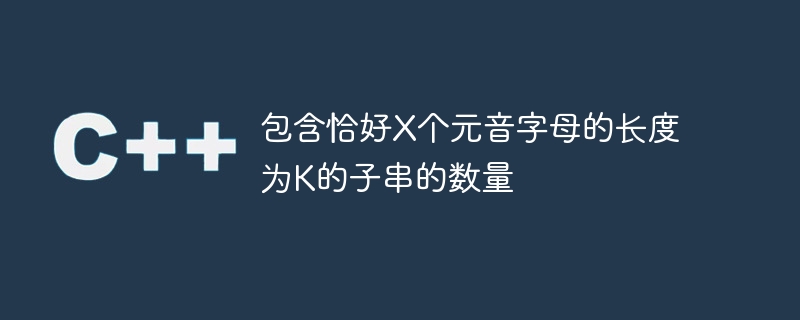包含恰好X個元音字母的長度為K的子串的數量
- WBOYWBOYWBOYWBOYWBOYWBOYWBOYWBOYWBOYWBOYWBOYWBOYWB轉載
- 2023-09-01 08:57:19794瀏覽

在這個問題中,我們需要找到長度為 K 且剛好包含 K 個元音的子字串的總數。我們將看到解決問題的兩種不同方法。我們可以使用簡單的方法來檢查每個長度為 K 的子字串中元音的數量。此外,我們可以使用滑動視窗方法來解決該問題。
問題陳述——我們給了一個長度為 N 的字串 str,包含小寫和大寫字母字元。我們需要統計長度為 K 且剛好包含 X 個元音的子字串的總數。
範例
輸入– str = "TutorialsPoint", K = 3, X = 2
輸出– 6
解釋– 長度為 3 且剛好包含 2 個母音的子字串為:'uto'、'ori'、'ria'、'ial'、'Poi' 和 'oin'。 p>
輸入– str = ‘aeiou’, K = 2, X = 2
輸出– 4
解釋-長度為2且剛好包含2個母音的子字串是:‘ae’、‘ei’、‘io’和‘ou’。
輸入– str = ‘fghjsdfdffg’, K = 5, X = 1
輸出– 0
解釋-字串str不包含任何元音,因此我們找不到任何包含1個元音的子字串。
方法 1
在這個方法中,我們將找到str的長度為K的每個子字串。之後,我們將計算特定子字串中元音的總數,如果發現它們等於 X,則可以將計數增加 1。
演算法
在 cntSubStr() 函數中,將「cnt」變數初始化為零,以儲存子字串的總數。
使用循環從第 0 個索引開始迭代到 len - K 索引,其中「len」是字串的長度。
在迴圈中,使用 substr() 方法取得從第 i 個索引開始的長度為 K 的子字串。
執行countVowel()函數來統計子字串中元音的總數。
在 countVowel() 函數中,將「vowels」變數初始化為零,以儲存母音總數。
遍歷子字串,目前字元為元音,將‘vowels’的值加1。
傳回「母音」。
在 cntSubStr() 函數中,如果子字串中的母音總數等於 X,則將「cnt」的值增加 1。
傳回「cnt」的值。
範例
#include <bits/stdc++.h>
using namespace std;
// function to count the total number of vowels in a string
int cntVowels(string alpha) {
int vows = 0;
for (int i = 0; i < alpha.length(); i++) {
if (alpha[i] == 'a' || alpha[i] == 'e' || alpha[i] == 'i' || alpha[i] == 'o' ||
alpha[i] == 'u' || alpha[i] == 'A' || alpha[i] == 'E' || alpha[i] == 'I' ||
alpha[i] == 'O' || alpha[i] == 'U')
vows++;
}
return vows;
}
int cntSubstr(string str, int K, int X) {
int cnt = 0;
// traverse the string and check for the total number of vowels in each substring of length K
for (int i = 0; i <= str.length() - K; i++) {
// get the substring of length K starting from index i
string sub = str.substr(i, K);
// check if the total number of vowels in the substring is equal to X, then increment cnt
if (cntVowels(sub) == X)
cnt++;
}
return cnt;
}
// Driver code
int main(void) {
string str = "TutorialsPoint";
int K = 3, X = 2;
cout << "The total number of substrings of length " << K << " containing " << X << " vowels is " << cntSubstr(str, K, X);
return 0;
}
輸出
The total number of substrings of length 3 containing 2 vowels is 6
時間複雜度– O(N*K),當我們遍歷str時,遍歷countVowel()函數中的子字串。
空間複雜度– O(K),因為我們儲存子字串
方法2
我們將使用滑動視窗技術來解決這種方法中的問題。我們將從子字串中刪除第一個字符,並在末尾添加 1 個字符。另外,我們將追蹤當前子字串中元音的計數,如果它等於 X,我們可以將計數增加 1。
演算法
定義 isVowel() 函數,根據特定字元是否為元音傳回布林值。
在 cntSubStr() 函數中,定義「total_vow」並初始化為零,以儲存目前視窗中的總元音。
從第 0 個索引開始,求長度為 K 的子字串中母音的總數,代表第一個視窗。
根據「vow」的值是否等於X,將「cnt」變數初始化為1或0。
開始從第 1 個位置遍歷字串到 len – K 索引。
如果 (i-1) 字元是母音,則將「total_vow」的值減 1。
如果第 (i - 1 K) 個索引處的字元是元音,則將「total_vow」的值增加 1。
如果「total_vow」等於 X,則將「cnt」增加 1。
傳回「cnt」的值。
範例
#include <bits/stdc++.h>
using namespace std;
bool isVowel(char ch) {
// convert character to lowercase
ch = tolower(ch);
return (ch == 'a' || ch == 'e' || ch == 'i' || ch == 'o' || ch == 'u');
}
int cntSubstr(string str, int K, int X) {
// To store total vowels
int total_vow = 0;
// Count the number of vowels in the first window
for (int p = 0; p < K; p++)
if (isVowel(str[p]))
total_vow++;
// to store the total number of substrings of length K containing X vowels
int cnt = 0;
// If the first window contains exactly X vowels, initialize cnt as 1
cnt = total_vow == X ? 1 : 0;
// traverse the string
for (int i = 1; i <= str.length() - K; i++) {
// exclude the (i - 1)th character from the window and update the total_vow
total_vow = isVowel(str[i - 1]) ? total_vow - 1 : total_vow;
// Add [i-1+K]th character to the current window and update total_vow
total_vow = isVowel(str[i - 1 + K]) ? total_vow + 1 : total_vow;
// If the current window contains exactly X vowels, increment cnt
if (total_vow == X)
cnt++;
}
return cnt;
}
int main(void) {
string str = "TutorialsPoint";
int K = 3, X = 2;
cout << "The total number of substrings of length " << K << " containing " << X << " vowels is " << cntSubstr(str, K, X);
return 0;
}
輸出
The total number of substrings of length 3 containing 2 vowels is 6
時間複雜度 - O(N),因為我們遍歷字串。
空間複雜度 - O(1),因為我們不使用任何額外的空間。
我們優化了第二種方法並降低了程式碼的時間複雜度。此外,我們也優化了第二種方法的空間複雜度。在這裡,我們找到了恰好包含 X 個元音字母的長度為 K 的子串總數,但是程式設計師可以嘗試找到恰好包含 K 個元音字母的任意長度的子字串總數。
以上是包含恰好X個元音字母的長度為K的子串的數量的詳細內容。更多資訊請關注PHP中文網其他相關文章!

